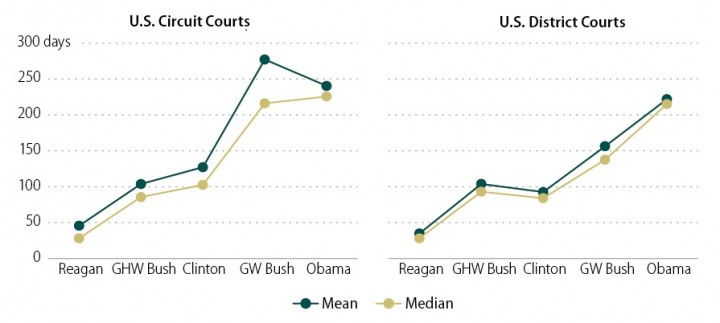President Obama incorrectly claims that the Senate has taken three times longer to confirm his court nominees than those of his predecessor, George W. Bush.
The president made the claim recently as he announced that he would nominate three judges to fill vacancies on the federal Circuit Court of Appeals for the District of Columbia:
Obama, June 4: Time and again, congressional Republicans cynically used Senate rules and procedures to delay and even block qualified nominees from coming to a full vote. As a result, my judicial nominees have waited three times longer to receive confirmation votes than those of my Republican predecessor. Let me repeat that: My nominees have taken three times longer to receive confirmation votes than those of my Republican predecessor.
The fact is, during Obama’s first term, his nominees to federal appeals courts actually were confirmed more quickly on average than Bush’s first-term nominees, measured from the day of nomination to the day of the confirmation vote.
Obama’s nominees to federal trial courts, on the other hand, did wait longer than Bush’s first-term picks — but only an average of 42 percent longer. That’s a significant difference but not nearly “three times” longer.
Here are the figures, from a May 2 report by the nonpartisan Congressional Research Service, comparing nominees confirmed during the first terms of each president:
- Circuit Courts of Appeals: Obama’s appeals court judges waited an average of 240.2 days between nomination and confirmation during his first term; Bush’s waited an average of 277.0 days during his first term, the longest of any recent president.
- District Courts: Obama’s federal trial court judges waited an average of 221.8 days from nomination to confirmation, 42 percent longer than the average wait of 156.2 for Bush’s first-term judges.
What Obama failed to make clear is that he wasn’t referring to the total wait time, but only to the time his nominees have waited for a vote after first being approved by the Senate Judiciary Committee.
Counting only the time between committee approval and confirmation, Obama’s circuit court judges waited an average of 138.5 days, more than triple the 35.3 days for Bush’s first-term nominees. For district court judges, the figures were 98.5 days for Obama, nearly (but not quite) triple the 34.9 days for Bush’s first-term picks.
But Bush’s nominees often waited hundreds of days just to get a hearing in late 2001 and 2002, when Democrats controlled the Senate and the hearing process. As Obama himself conceded in his June 4 remarks, “Democrats weren’t completely blameless when I was in the Senate.”
Obama would have been correct to say his nominees waited three times longer for a floor vote after getting committee approval. But it’s also true that Bush’s first-term nominees to federal circuit courts waited nearly four times longer just to get a Senate hearing: an average of 274.6 days compared with only 69.6 days for Obama’s first-term picks. Both parties have used the means available to them to delay nominees when it suited their purpose.
The bigger picture here is that partisan haggling over judicial nominees has grown worse over the years, causing longer and longer delays. In Ronald Reagan’s first term, his circuit court judges waited an average of only 45.5 days from nomination to confirmation — going through five times faster than Obama’s and six times faster than George W. Bush’s.
The worsening trend is displayed visually in this chart from the CRS study, which gives both mean (average) and median (midpoint) wait times for the circuit court and district court judges appointed and confirmed during the most recent five presidents’ first terms.
— Brooks Jackson
